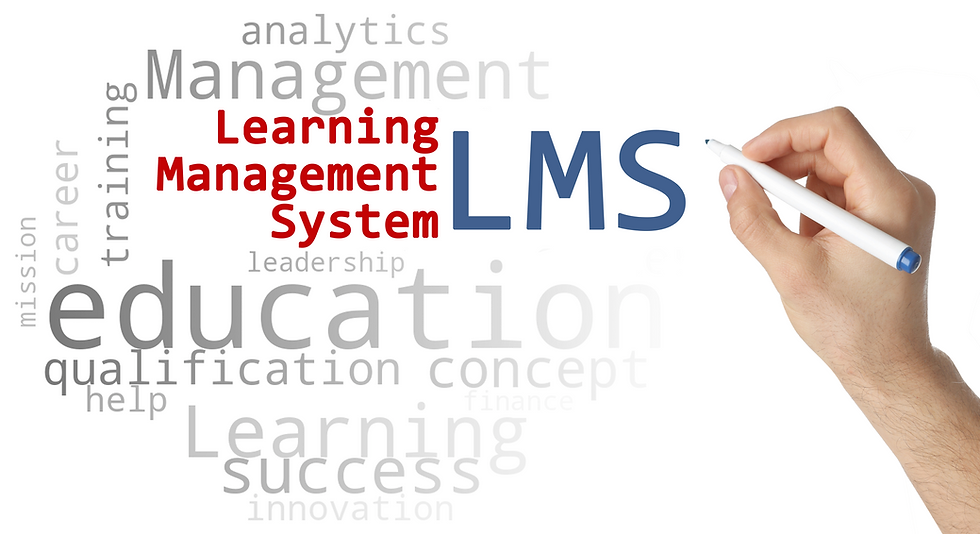What are the Different Types of Learning Management Systems?
- LMSPortals

- Oct 1, 2024
- 7 min read

A Learning Management System (LMS) is a software platform used to manage, deliver, and track educational courses, training programs, or learning and development initiatives. There are various types of LMS platforms, each designed to meet specific needs depending on the target audience, learning objectives, and organizational requirements.
Below is an overview of the main types of LMS:
1. Cloud-Based LMS (SaaS)
Description: A cloud-based LMS, also known as a Software-as-a-Service (SaaS) LMS, is hosted on the vendor's server and accessed through the internet. Users can log in via a web browser without needing to install software on their devices.
Key Features:
Accessible from any device with an internet connection
Regular updates and maintenance are handled by the vendor
Subscription-based pricing models
Scalable for large and small organizations
Best For:
Businesses and educational institutions that want flexibility and ease of access
Organizations with remote or geographically dispersed learners
2. Self-Hosted LMS
Description: A self-hosted LMS is hosted on the organization’s servers, giving them complete control over the platform. Organizations need to handle the installation, updates, and maintenance of the system.
Key Features:
Full control over customization and data security
One-time purchase or licensing fees, but additional costs for maintenance and updates
May require a dedicated IT team for ongoing support
Customizable to fit specific needs
Best For:
Large enterprises or institutions that require high customization and control
Organizations with specific data security requirements
3. Open-Source LMS
Description: Open-source LMS platforms are free and available to anyone, but they require significant customization and technical expertise to set up and maintain.
Key Features:
Fully customizable as the source code is accessible
Free to use, but costs can arise from customization and maintenance
Active communities that provide updates, plugins, and extensions
Best For:
Tech-savvy organizations that want complete control over the platform
Educational institutions and non-profits with a limited budget but internal technical expertise
4. Corporate LMS (Enterprise LMS)
Description: These systems are designed specifically for corporate training and development. Corporate LMS platforms focus on employee onboarding, compliance training, skills development, and continuous professional development.
Key Features:
Built-in features for tracking certifications and compliance
Integration with HR and talent management systems
Personalized learning paths for employees
Focus on performance metrics and business objectives
Best For:
Medium to large enterprises that need to train employees across different roles and locations
Businesses focused on employee development, performance, and compliance
5. Academic LMS
Description: Designed for educational institutions, academic LMS platforms support schools, universities, and other educational environments. These systems manage curriculum delivery, student performance, grading, and communication.
Key Features:
Support for curriculum design and assessment tools
Integration with student information systems (SIS)
Collaborative features like discussion forums and peer reviews
Tools for tracking student progress, attendance, and grading
Best For:
Schools, universities, and educational institutions offering structured courses and degree programs
6. Mobile LMS
Description: Mobile LMS platforms are optimized for mobile devices, allowing learners to access content anytime, anywhere via smartphones or tablets. These systems are designed to enhance mobile learning experiences.
Key Features:
Mobile-responsive design
Offline access to course materials
Microlearning and bite-sized content delivery
Push notifications for assignments, reminders, or updates
Best For:
Organizations with mobile-first learners or employees who are frequently on the go
Industries where quick, on-demand learning is critical (e.g., healthcare, sales)
7. Social Learning LMS
Description: These systems incorporate social learning features that enable collaboration, interaction, and knowledge sharing among users. Social Learning LMS platforms often have discussion forums, peer-to-peer learning, and social media integration.
Key Features:
Collaborative tools (discussion forums, wikis, chats)
Integration with social media platforms
Peer learning and content sharing features
Gamification elements like badges and leaderboards
Best For:
Organizations that want to foster a collaborative learning environment
Institutions that encourage peer-to-peer learning and team collaboration
8. Learning Experience Platforms (LXP)
Description: LXPs go beyond traditional LMS platforms by focusing on the overall learning experience and personalized learning paths. They offer a more learner-centric approach and integrate content from multiple sources, including third-party platforms.
Key Features:
AI-driven content recommendations
Curated learning paths based on user preferences and goals
Support for multiple content formats (videos, podcasts, blogs)
Integration with external content providers (LinkedIn Learning, Coursera)
Best For:
Companies that want to provide personalized learning experiences
Organizations seeking more flexible, on-demand learning options
Choosing the right LMS depends on the specific needs of an organization or institution. Cloud-based LMS platforms offer flexibility and scalability, while self-hosted and open-source solutions provide greater control. Corporate and academic LMS systems are tailored to specific learning environments, while mobile and social learning platforms cater to modern learning behaviors. For organizations that focus on personalized, learner-driven experiences, an LXP might be the best choice.
What Type of Learning Management System is right for My Organization?
To determine the right type of Learning Management System (LMS) for your organization, it's important to consider a range of factors including the size of your organization, your learning objectives, your budget, and the technical capacity of your team.
Here’s a guide that can help you decide:
Key Factors to Consider
Organization Size and Scale
Small to Medium-Sized Organizations: A cloud-based LMS (SaaS) may be the best choice because of its flexibility, ease of setup, and scalability. Cloud-based LMS platforms can handle a growing number of users and allow you to avoid heavy upfront costs.
Large Enterprises: If your organization has specific needs or advanced data security requirements, a self-hosted LMS or enterprise LMS could offer more customization and control over your data.
Learning Objectives
Corporate Training and Development: If you're focused on employee training, compliance, and skill development, a corporate LMS is ideal. These platforms usually integrate with HR systems and track certifications and professional development.
Academic Learning: If you're a school, university, or educational institution, an academic LMS will offer features like curriculum management, grading tools, and student performance tracking.
Customization Needs
Off-the-Shelf Solution: If you’re looking for a straightforward solution without heavy customization, a cloud-based or corporate LMS will provide pre-built functionality with minimal setup.
Full Customization: If your organization has unique requirements, an open-source LMS like Moodle or a self-hosted LMS may be a better fit. This option allows for complete control over how the platform is configured, but it requires technical expertise.
Budget
Low Budget: If you are working with a limited budget, an open-source LMS could save costs on licensing fees, although you’ll need resources for hosting, development, and ongoing maintenance.
Subscription Model: Cloud-based LMS platforms typically offer subscription pricing, which can be beneficial for organizations without the resources to maintain an LMS internally.
Enterprise Solution: Large organizations with bigger budgets might consider enterprise LMS solutions that offer extensive support, integration, and customization options.
User Accessibility
Mobile Learners: If your employees or learners need to access content on the go, consider a mobile LMS that’s optimized for smartphones and tablets, enabling anytime, anywhere learning.
Social and Collaborative Learning: For organizations that emphasize peer-to-peer learning, collaboration, and interaction, a social learning LMS or platforms with strong collaboration tools will be beneficial.
Technical Expertise
Minimal IT Support: If you don’t have an internal IT team to manage the system, a cloud-based LMS is ideal since the vendor will handle updates, maintenance, and security.
In-House IT Support: If your organization has IT staff capable of managing a complex system, a self-hosted LMS could give you more control over the platform.
Matching LMS Types to Organizational Needs
Here are some recommendations based on specific scenarios:
Scenario 1: Small to Medium-Sized Business Focused on Employee Training
Recommended LMS: Cloud-Based Corporate LMS
Ease of use, minimal technical setup, and subscription pricing make cloud-based LMS ideal.
A corporate-focused LMS offers features such as compliance tracking, employee onboarding, and skills development.
Scenario 2: Large Enterprise with Security and Customization Needs
Recommended LMS: Self-Hosted or Enterprise LMS
Large organizations that require extensive customization, robust data security, and integration with existing systems would benefit from a self-hosted solution.
An enterprise LMS can offer comprehensive support for internal teams, integrations with HR systems, and detailed analytics.
Scenario 3: Educational Institution Offering Online Courses
Recommended LMS: Academic LMS
Choose an academic LMS like Canvas or Blackboard, which are designed to handle course management, student assessments, and collaboration tools specifically for schools and universities.
Scenario 4: Non-Profit with Budget Constraints
Recommended LMS: Open-Source LMS
An open-source solution like Moodle allows non-profits to build their own customized platform without recurring fees, but it requires in-house technical expertise for maintenance and updates.
Scenario 5: Company with Mobile Workforce
Recommended LMS: Mobile LMS
Opt for a mobile-friendly platform that allows your learners to access training materials and complete tasks from their smartphones. Mobile LMS platforms are great for employees who need training on the go, such as sales teams or field workers.
Scenario 6: Organization Focusing on Social Learning and Collaboration
Recommended LMS: Social Learning LMS
If your organization emphasizes collaboration, teamwork, and peer learning, look for a social learning LMS that integrates discussion forums, peer-to-peer learning, and content sharing.
Summary: Finding the Right LMS for Your Organization
The right LMS for your organization depends on several variables such as your size, budget, the complexity of your learning needs, and whether you have the technical resources to support a more complex system.
Here’s a quick summary to guide you:
Cloud-Based LMS: Best for flexibility and ease of access, suitable for most organizations.
Self-Hosted LMS: Best for organizations that need full control and customization.
Open-Source LMS: Ideal for budget-conscious organizations with in-house IT resources.
Corporate LMS: Tailored for business training and employee development.
Academic LMS: Perfect for schools and educational institutions.
Mobile LMS: Great for organizations with a mobile workforce.
Social Learning LMS: Best for collaborative, peer-to-peer learning environments.
By aligning your choice with your organizational needs, you can ensure that the LMS you select will support your goals effectively and efficiently.
About LMS Portals
At LMS Portals, we provide our clients and partners with a SaaS-based, multi-tenant learning management system that allows you to launch a dedicated training environment (a portal) for each of your unique audiences.
The system includes built-in, SCORM-compliant rapid course development software that provides a drag and drop engine to enable most anyone to build engaging courses quickly and easily.
We also offer a complete library of ready-made courses, covering most every aspect of corporate training and employee development.
If you choose to, you can create Learning Paths to deliver courses in a logical progression and add structure to your training program. The system also supports Virtual Instructor-Led Training (VILT) and provides tools for social learning.
Together, these features make the LMS Portals platform the ideal SaaS-based LMS for our clients and reseller partners.
Contact us today to get started or visit our Partner Program pages



Comments